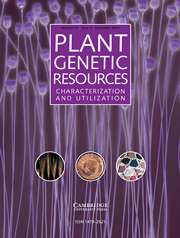Article contents
Polymorphism of waxy proteins in Spanish hulled wheats
Published online by Cambridge University Press: 15 March 2011
Abstract
Hulled wheats are neglected crops that have potential in plant breeding programmes of modern durum and common wheat. Among these wheats, three species were widely cultivated in Spain until the mid 20th century: Triticum monococcum ssp. monococcum (einkorn), Triticum turgidum ssp. dicoccum (emmer) and Triticum aestivum ssp. spelta (spelt). One important aspect of wheat grain quality is starch composition, which is related to the action of waxy proteins. A collection of 536 accessions of Spanish hulled wheats was analyzed for waxy protein composition using sodium dodecyl sulphate-polyacrylamide gel electrophoresis (SDS-PAGE). Polymorphism was found for the Wx-A1, Wx-B1 and Wx-D1 proteins, including new and null alleles in the three species. An allelic variant with an electrophoretic mobility not previously described was found in einkorn wheat. In emmer and spelt, some alleles with different mobility were also found. A Wx-B1 null allele was detected in emmer wheat, and null alleles for Wx-A1, Wx-B1 and Wx-D1 were found in spelt wheat. The variations found could be used to enlarge the gene pool available to breeders, and to design new cultivars with different levels of amylose content.
- Type
- Research Article
- Information
- Copyright
- Copyright © NIAB 2011
References
- 2
- Cited by


